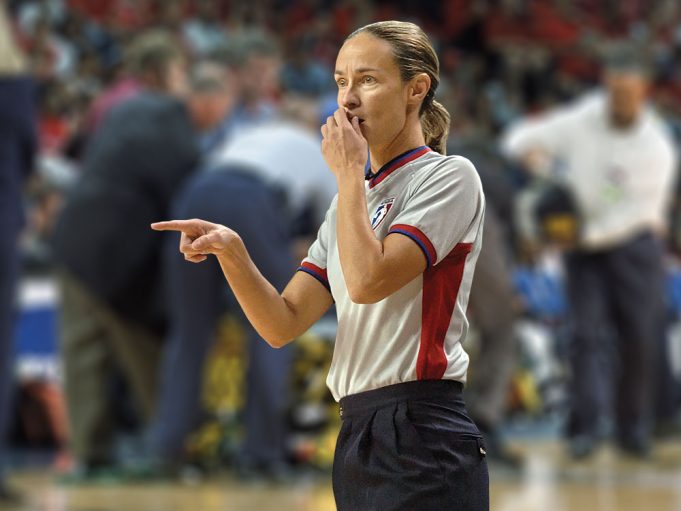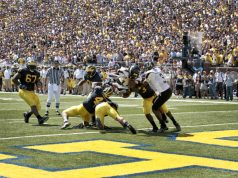It is Aug. 20, 2002 and the WNBA is becoming firmly entrenched as a professional league, now in the playoffs of its sixth season. The Houston Comets, who won the championship the first four years, are facing the Utah Starzz in the deciding game of a best-of-three playoff in the Western Conference semifinals at the Compaq Center in Houston, formerly known as The Summit.
Lisa Mattingly is one of three referees working the game. This is not going to be just another game, not even just another playoff game. This is a game that Lisa Mattingly will never forget.
During a timeout early in the second half, Mattingly and fellow referee Roy Gulbeyan look over to the scorer’s table and see their third official, Bill Stokes, lying on the ground. He has suffered a heart attack.
The noisy arena, with 9,540 fans present, falls silent. The Comets’ trainer and team doctors go to work on Stokes right away. “Thankfully they had an AED (automated external defibrillator) there,” says Mattingly. They use paddles to shock Stokes’ back to life. Eventually he is loaded onto a stretcher and wheeled off the court. Mattingly and Gulbeyan follow.
“They closed the door in our face,” says Mattingly, upset she can’t stay with her fellow official.
Stokes, who has been a referee in the WNBA since the league begins in 1997, is taken to Memorial Hermann Southwest Hospital.
“The game was on national TV,” recalls Mattingly. “It went off the air. My voicemail blew up.”
Val Ackerman, president of the WNBA, is at the game. She has a difficult decision to make. Finish the game now or suspend it until a later date. There is 15:33 left to play.
“They had a timetable to keep,” says Mattingly. “There are only so many days the arena is available and this is the playoffs. We’re told we’ve got to finish the game. They took some heat for it. Val did what was best for the league.”
Ackerman leaves the arena to be with Stokes.
The players would probably have preferred to go home. Same with the referees.
“We didn’t want to do it,” says Mattingly, worried about her friend Stokes. “It was very hard. I didn’t know if I could do it. I was a mental wreck.”
Everyone is back on the court. “All the players were in tears,” remembers Mattingly. Someone begins reciting the Lord’s Prayer and the crowd stands in unison and joins in. “It brought some humanity to the game,” she says.
Twenty-five minutes later the game resumes with Mattingly and Gulbeyan as the only two referees. “I hadn’t worked a two-person crew in years,” she says. “I was all over the court to start, but we finally got settled in. We finished the game under duress. It was very hard. It’s about like being in a car wreck.”
Utah wins, 75-72, to advance to the Western Conference finals vs. the Los Angeles Sparks, the eventual champions.
Mattingly goes immediately to the hospital to check on Stokes. He is in critical condition. She begins calling Stokes’ family and friends. She and Stokes have been friends for a decade and referee many college games together, as well as WNBA games.
Mattingly must work another playoff game days later in Utah. But she returns to Houston to visit Stokes in the hospital.
Ten days after the heart attack, Stokes, after undergoing bypass surgery and having a defibrillator installed in his chest, is released from the hospital, but he never officiates again.
Mattingly, one of the top female officials in the country, continued to referee for another 16 years. The last game she worked was the 2018 women’s Final Four. After 28 years as an NCAA Division I referee, plus 10 years in the WNBA, she retired to become supervisor of officials for the SEC, WAC, Sun Belt, Southland and Atlantic Sun conferences.
Mattingly, now 56, has homes in Clearwater, Fla., and Nicholasville, Ky. She says for the first month or two, when she attends college games as a supervisor, she will probably bring her official’s gear along, “just in case they need a third referee.”
What's Your Call? Leave a Comment:
Note: This article is archival in nature. Rules, interpretations, mechanics, philosophies and other information may or may not be correct for the current year.
This article is the copyright of ©Referee Enterprises, Inc., and may not be republished in whole or in part online, in print or in any capacity without expressed written permission from Referee. The article is made available for educational use by individuals.



















